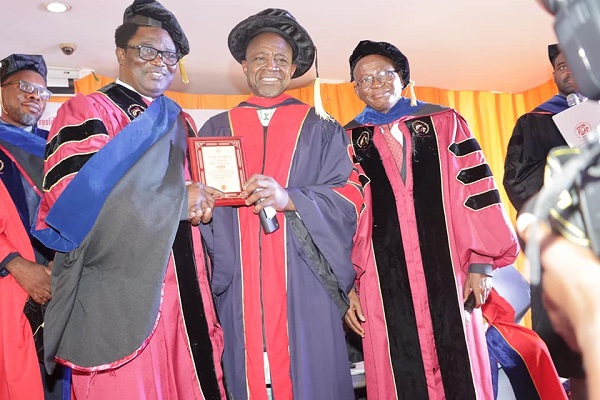
The acting president of the African University of Science and Technology (AUST), Prof. Peter Onwualu has tasked students to learn and relearn daily with digital skills, to deploy the knowledge in their various countries to eradicate poverty.
Onwualu, who was speaking during the institution’s ninth convocation ceremony for the classes of 2021 and 2022 in Abuja. The 145 graduands comprised of 2 post-graduates, 105 masters and 38 doctorate graduands.
The don advised the students to continue developing themselves and hold up the reputation of the school and their competence.
“The world is dynamic and highly competitive, scale up your skills.
“This is the age of skills’ competence, particularly digital skills, that go beyond the existing knowledge acquired in the university. It is anticipated, conservatively, that by 2025, automation and robots would have eliminated the majority of current occupations.
“New market demands are evolving or will evolve. Prepare yourself for the future of work and the work of the future, prompted by globalisation and the 4th Industrial Revolution”.
Onwualu disclosed that the university has developed a new, academic programme – innovation and entrepreneurship – to ensure that the university’s research results are commercialised.
Presenting a lecture “Using technologies to provide solutions to poverty in Africa”, the national coordinator, National Social Investment Programme, Dr. Umar Bindir, revealed that Africa, especially Nigeria, has failed to decode how to connect its academia, “the output of our research and very knowledgeable people to solving our social problems”.
He said: “Nigeria has between 240 to 250 universities. No country can have these kinds of very powerful institutions and still have challenges of absolute poverty at the levels we have.
“The input of this lecture in a science and technology institution, a prime technology university in Nigeria, is to ginger both the academics and students to realise the opportunities we have in our country to deploy this high-level knowledge to solve primordial problems [and get ourselves out of the] primitive and absolute poverty that we have found many of our people in.
“Scientists, researchers and research institutions should somehow be encouraged and even pushed to do research that is relevant to Nigeria’s problems. Also, this involves teaching and building [the] capacity of young people relevant to Nigeria’s problems so that, for example, they can see the advantages of palm oil in the southeast and south-south and how it can be used to manufacture soap that can be used across Nigeria. Also, young people in the east can now study the technique of evolving yoghurt manufacturing and cheese-making opportunities in the north where the cows and milk are. This kind of osmosis of socialisation can only happen in tertiary institutions.
“So, we must be able to learn that we cannot allow our institutions to evolve as tribal institutions. As institutions of higher learning, they must be cosmopolitan. This university is a very good example; it is not just cosmopolitan for Nigeria but for the continent. You can see the difference because you are interacting with people from different cultures.”
Addressing the graduands, the executive vice chairman (EVC) of the National Agency for Science Technology and Engineering Infrastructure (NASENI), Prof. Mohammed Haruna charged students to go out and apply their education to solve the problem of marginalisation and corruption in their countries.
“The graduates come from 11 different African countries and these countries have so many socio-economic problems and it is [only through] education that they have come from their countries to interact with students of other nations, seen a different environment and learnt to live together, tolerant and accommodate different opinions.”
Speaking further, he explained that scientists need an enabling environment to help them survive in a troubling society.
“Science, technology and innovation are the solutions. But, generally, across the continent, administrators and politicians on the continent are yet to embrace these solutions that have created headway all over the world.
The president of the Council of Registered Engineer Nigeria (COREN), Engr. Ali Rabiu advised state governments to carry out programmes that will create employment opportunities for young people particularly and create social programmes that can help vulnerable people earn money.
“There is a lot of poverty in the land and providing solution technologies to tackling poverty is quite interesting.
“This university has been a specialised university for post-graduates and researchers only,” he said.

